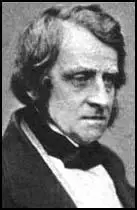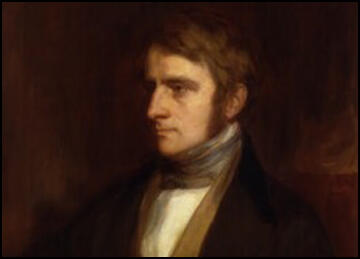John Roebuck

John Roebuck, the son of Ebenezer Roebuck, a civil servant in the East India Company, was born in Madras in India on 28th December, 1802. When John's father died in 1807 his mother brought the family back to England. She remarried and in 1815 John was taken to Canada to live.
Roebuck returned to England at the age of twenty-two to study law at the Inner Temple in London. He joined the Utilitarian Society became friendly with John Stuart Mill. Roebuck became active in the campaign for increasing the franchise and after the 1832 Reform Act was selected to represent the Whigs at Bath.
After entering the House of Commons he caused a stir by promoting a wide-range of radical policies including the expropriation of the property of the Church of England. Although accused of preaching open rebellion he retained his Bath seat in the 1835 General Election.
In 1834 Roebuck led the campaign to free the Tolpuddle Martyrs and called for the repeal of the Corn Laws. Roebuck joined with Francis Place and Joseph Hume to produce a volume of essays entitled Pamphlets for the People (1835). In one of these pamphlets, The Stamped Press and its Morality, Roebuck attacked the 1815 Stamp Act that had placed a 4d tax on newspapers. Roebuck criticised those newspaper owners who accepted this law. The editor of the Morning Chronicle was so upset he challenged Roebuck to a duel. Roebuck accepted and survived and later that year welcomed the decision to reduce the tax to one penny.
In June 1836, John Roebuck joined forces with William Lovett, Henry Hetherington, John Cleave, Henry Vincent and James Watson formed the London Working Men's Association (LMWA). Although it only ever had a few hundred members, the LMWA became a very influential organisation. At one meeting in 1838 the leaders of the LMWA drew up a Charter of political demands.
(i) A vote for every man twenty-one years of age, of sound mind, and not undergoing punishment for a crime.
(ii) The secret ballot to protect the elector in the exercise of his vote. (iii) No property qualification for Members of Parliament in order to allow the constituencies to return the man of their choice. (iv) Payment of Members, enabling tradesmen, working men, or other persons of modest means to leave or interrupt their livelihood to attend to the interests of the nation. (v) Equal constituencies, securing the same amount of representation for the same number of electors, instead of allowing less populous constituencies to have as much or more weight than larger ones. (vi) Annual Parliamentary elections, thus presenting the most effectual check to bribery and intimidation, since no purse could buy a constituency under a system of universal manhood suffrage in each twelve-month period."

John Roebuck had now completely broken with the Whigs and described them as "an exclusive and aristocratic faction, though at times employing democratic principles and phrases as weapons of offence against their opponents. When out of office they are demagogues; in power they become exclusive oligarchs." Without the support of the Whigs, Roebuck lost his Bath seat in the 1837 General Election.
Out of the House of Commons Roebuck's views became less extreme and in the 1841 General Election won Bath again. He supported the reforms of Robert Peel, but he remained radical on some issues and spoke out in favour of the Chartist movement and helped present their petition to Parliament in 1842.
Defeated at Bath in the 1847 General Election, Roebuck moved to Sheffield and was re-elected to the House of Commons in a by-election in 1849. Roebuck upset his radical friends by losing interest in domestic reform. After his election he supported the aggressive foreign policy of Lord Palmerston. This was popular with his constituents and he was re-elected in 1852, 1857, 1859 and 1865.
The views expressed by John Roebuck became increasingly conservative. He admitted in 1864 that: "the hopes of my youth and manhood are destroyed and I am left to reconstruct my political philosophy". Although a long-term supporter of universal suffrage, during the debate on the 1867 Reform Act he warned against placing political power "in the hands of the ignorant". Roebuck denounced the activities of trade unionists in what became known as the Sheffield Outrages and opposed his party leader, William Gladstone, when he attempted to disestablish the Anglican Church in Ireland. By this time the members of the Liberal Party in Sheffield were totally disillusioned with Roebuck and selected another candidate for the forthcoming parliamentary election. Roebuck stood as an Independent but was easily defeated in the 1868 General Election.
With the support of the Conservative Party, Roebuck won the Sheffield seat in the 1874 General Election. In the House of Commons he denounced William Gladstone as a "bastard philanthropist" and praised the policies of Benjamin Disraeli.
John Roebuck died of heart failure on 30th November 1879.

